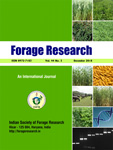JASPREET KAUR AND GULAB PANDOVE
Department of Microbiology, Punjab Agricultural University, Ludhiana-141 004 (Punjab), India
School of Organic Farming, Punjab Agricultural University, Ludhiana-141 004 (Punjab), India
*(e-mail: gpandove@pau.edu)
(Received: 18 April 2024; Accepted: 12 June 2024)
SUMMARY
Salinity is one of the most severe abiotic stresses that limit global crop productivity by affecting the growth of plants. However, the need of the hour is to expand the agricultural areas to saline regions for food security amidst growing human populations. Plant growth-promoting bacteria (PGPB) offer a promising solution to enhance plant growth in saline environments. The present study evaluates the plant growth-promoting characteristics of potential plant growth- promoting bacteria (PGPB) i.e. Burkholderia seminalis, Stenotrophomonas maltophilia, and Enterobacter sp. (JJG_Zn) under varying levels of simulated salinity stress (0 mM, 50 mM, 100 mM, and 150 mM). All the three PGPBs exhibited plant growth-promoting traits i.e Indole-3-acetic acid (IAA) production, gibberellic acid production, Phosphate solubilization, ammonia production, siderophore production, and ACC deaminase activity even at the highest concentration i.e. at 150 mM of saline stress. Furthermore, the beneficial effect of bacterial inoculants of aforesaid bacterial cultures on saline stress tolerance in forage sorghum through bio priming was also evaluated under in vitro conditions. The dual inoculation of B. seminalis + S. maltophilia (T5) was found to improve the germination parameters viz., germination percentage, germination speed, mean germination, and physiological traits such as shoot length, root length, fresh and dry shoot and root weight, and seed vigor index I and II over the uninoculated controls across different salt concentrations. Thus, the study suggests that bio-priming of forage sorghum seeds with potential liquid bacterial inoculants may mitigate the detrimental effects of saline soil and promote seedling growth and development. Therefore, these promising bacterial cultures can be further exploited under the salinity-affected regions across agro-climatic zones. Also, a thorough biosafety analysis of these cultures should be conducted, considering the ‘one health’ concept.
Key words: Burkholderia seminalis, Enterbacter sp. (JJG_Zn), liquid bacterial inoculants, PGPR, salinity, Stenotrophomonas maltophilia

